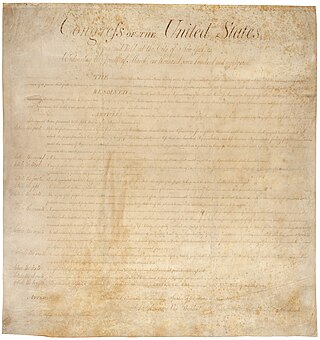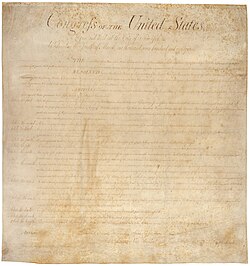United States Bill of Rights
first ten amendments to the United States Constitution From Wikipedia, the free encyclopedia
Remove ads
The Bill of Rights is the name for the first ten amendments to the United States Constitution, which limit the power of the federal government and guarantee citizens of the United States certain rights. The amendments were written in 1789 by James Madison, and were based on important ideas about personal rights. The Bill of Rights went into effect in 1791, when 3/4 of the states agreed that they were fair. Originally, the Bill of Rights had 12 different amendments, but the first two were not passed by enough states. The second amendment that was not passed was eventually added to the Constitution in 1992, becoming the 27th amendment in the Constitution.
Remove ads
Remove ads
Text
First Amendment
"Congress shall make no law respecting an establishment of religion, or prohibiting the free exercise thereof..."
- This means that the government cannot make any religion an official religion. It also cannot stop people from practicing any religion.
"...or abridging the freedom of speech"
- This means that the government cannot stop people from saying what they think. It applies to many forms of expression, like art. However, people do not have freedom to say things that will limit other people's rights. For example, people do not have the freedom to threaten to kill other people.
"...or of the press"
- This means that the government cannot prevent newspapers and other news sources from reporting the news.
"...or of the right of the people to peaceably assemble..."
- This means that people can protest things by getting together and having rallies or marches, as long as they are not violent.
"...and to petition the government for redress of grievances."
- This means that people can complain to the government about things they do not like. They can ask the government to fix those things.
Second Amendment
"A well regulated Militia being necessary to the security of a free State, the right of the people to keep and bear arms, shall not be infringed."
- People have the right to own firearms.
Third Amendment
"No Soldier shall, in time of peace be quartered in any house he consent of the Owner, nor in time of war, but in a manner to be prescribed by law."
- This means that people cannot be forced to keep soldiers in their houses.
Fourth Amendment
"The right of the people to be secure in their persons, houses, papers, and effects, against unreasonable searches and seizures, shall not be violated..."
- The government does not have the right to search people or their property without a good reason, and it does not have the right to take people's property without a good reason.
"...and no Warrants shall issue, but upon probable cause, supported by Oath or affirmation, and particularly describing the place to be searched, and the persons or things to be seized."
- A search warrant, which gives the police permission to search a person's property, can only be issued if there is a good reason to think that the person is hiding something that might show that a crime has been committed.
Fifth Amendment
"No person shall be held to answer for any capital, or otherwise infamous crime, unless on a presentment or indictment of a Grand Jury, except in cases arising in the land or naval forces, or in the Militia, when in actual service in time of War or public danger..."
- If somebody is accused of committing a very serious crime, including crimes that can be punished with the death penalty, they have the right to have a grand jury decide if there is enough evidence to put the person on trial. However, this does not apply to somebody who is accused of committing a crime while serving in the military.
"...nor shall any person be subject for the same offence to be twice put in jeopardy of life or limb..."
- If somebody is accused of committing a crime and goes to a trial, and is found not guilty, the person cannot be forced to have a second trial. The idea of giving the same person a second trial after being found not guilty the first time is called double jeopardy.
"...nor shall be compelled in any criminal case to be a witness against himself..."
- Somebody cannot be forced to testify against themselves in court. This means that they cannot be forced to say things that hurt their case in a trial.
"nor be deprived of life, liberty, or property, without due process of law; nor shall private property be taken for public use, without just compensation."
Sixth Amendment
"In all criminal prosecutions, the accused shall enjoy the right to a speedy and public trial, by an impartial jury of the State and district where in the crime shall have been committed, which district shall have been previously ascertained by law..."
- If somebody is accused of a crime, they have the right to a trial that does not take too long to start after the person is accused of the crime. The trial must be held in public and cannot be secret. The person has the right to have a jury who will decide the case fairly. Members of the jury cannot decide which side they will take before the trial starts. They also have the right to have their trial in the same area where the crime was committed.
"...and to be informed of the nature and cause of the accusation; to be confronted with the witnesses against him; to have compulsory process for obtaining witnesses in his favor..."
- Somebody who is going on trial for a crime has the right to know why they are being accused of a crime and to ask questions to any witnesses who testify (say in court) that the person committed the crime. A person that is going on trial has the right to have witnesses to the trial who say that the person did not commit the crime.
"...and to have the Assistance of Counsel for his defense."
- A person going on trial for a crime has the right to be defended by a lawyer.
Seventh Amendment
"In suits at common law, where the value in controversy shall exceed twenty dollars, the right of trial by jury shall be preserved, and no fact tried by a jury, shall be otherwise re-examined in any court of the United States, than according to the rules of the common law."
- If somebody sues somebody over something that is worth at least $20, this is called a civil trial. They have the right of a jury trial. The decision of the jury is final, although in some rare cases, the judge can throw out the jury's decision and bring in a new jury if the judge thinks that the jury's decision ignored the facts that they learned during the trial.
Eighth Amendment
"Excessive bail shall not be required..."
- If somebody is arrested, they cannot be given too high of an amount for bail. Bail is something that people who are arrested have to pay if they want to be let out of jail before their trial starts. If they show up for their trial, they will get their money back.
"nor excessive fines imposed, nor cruel and unusual punishments inflicted."
- If a jury in a trial decides that somebody is guilty of a crime, their punishment cannot be too harsh or cruel. They also cannot be forced to pay too high of an amount of money as punishment for their crime.
Ninth Amendment
"The enumeration in the Constitution, of certain rights, shall not be construed to deny or disparage others retained by the people."
- People can have other rights, even if the Constitution does not specifically talk about them.
Tenth Amendment
"The powers not delegated to the United States by the Constitution, nor prohibited by it to the States, are reserved to the States respectively, or to the people."
- If the Constitution does not specifically say that the federal (United States) government has the power to do something, then the power to do it goes to the state government unless the Constitution specifically says that states can not do so.
Remove ads
References
Wikiwand - on
Seamless Wikipedia browsing. On steroids.
Remove ads

